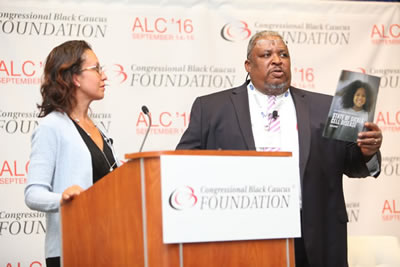SCDC Update
The Sickle Cell Disease Coalition (SCDC) was recently formed to help amplify the voice of the SCD stakeholder community, promote awareness and improve outcomes for individuals with SCD. The SCDC focuses on promoting research, clinical care, education, training, and advocacy and the growing membership of over 30 national and global groups is comprised of public health, research and provider organizations; patient groups; federal agencies, industry, and funding organizations. More information about the SCDC is available on the About the Sickle Cell Disease Coalition page. The SCDC Update, the coalition newsletter, will be issued at least six times per year with the aim of bolstering collaboration and information-sharing SCDC members and the SCD community at-large.
CDC's Public Health Grand Rounds Presents: "Improving the Lives of People with Sickle Cell Disease"
Join the Centers for Disease Control and Prevention’s (CDC) November 15 webcast which will feature presentations by Drs. Mary Hulihan, Kim Smith-Whitley, Kathryn Hassel, and Jean Raphael about the current state of medical care and public health surveillance for sickle cell disease. The program is scheduled from 1-2:00 p.m. and a live external webcast will be available via the Webcast Links section of the CDC’s website. If you are unable to join live, a video of the session will be posted to the archives section after the presentation.
NHLBI Awards Grants to Help Improve Health Outcomes for Teens, Adults with Sickle Cell Disease
The National Heart, Lung, and Blood Institute (NHLBI) recently awarded nearly $36 million in grants to help improve the quality of health care for teens and adults in the United States with sickle cell disease (SCD). The six year grants are the first of their kind dedicated to testing strategies that could boost health outcomes for this group of young adults. The grants were awarded to the following eight clinical sites across the country as part of the Sickle Cell Disease Implementation Consortium (SCDIC) project.
An additional $6 million was awarded to establish an SCDIC Data Coordinating Center, which will support the research efforts of the SCDIC project. The grants will support the work of researchers who will develop and test the effectiveness of strategies appropriate for the communities their clinical sites serve, whether they are urban, suburban, or rural. Visit the NHLBI website to learn more about the grant program and recipients.
Patient Volunteers Needed: ASH Clinical Practice Guidelines on Sickle Cell Disease
The American Society of Hematology (ASH) is developing new clinical practice guidelines on the management of acute and chronic complications of SCD. The clinical practice guidelines panel will review available evidence and provide recommendations to physicians about how to diagnose or treat this medical condition. ASH has formed five guideline panels to examine different aspects of SCD including pain, cardiopulmonary/kidney disease, cerebrovascular disease, transfusions and transplantation. Each guideline panel includes multidisciplinary clinical experts, as well as experts in the review scientific evidence. The guidelines are expected to be published in early 2019.
ASH invites non-physician volunteers to serve as patient representatives on the five panels. By including individuals with SCD or caregivers of individuals with SCD, ASH aims to ensure that the panels give attention to the perspective of patients. Individuals who volunteer for this project will have opportunity to make a valuable contribution to the guidelines. They will be included in discussions about the evidence, and will participate in decision-making about the recommendations.
If you would like to participate or have questions about this opportunity, please contact Starr Webb, MPH, at swebb@hematology.org. Preference will be given to those who contact ASH by December 30, 2016. A small honorarium will be provided to patients selected to participate.
Highlights from National Sickle Cell Awareness Month

In early September, the SCDC collectively launched the Call to Action on SCD and officially announced the formation of the Coalition. During the launch event, the American Society of Hematology (ASH) issued a report titled State of Sickle Cell Disease: 2016, which was endorsed by a number of SCDC members. The report outlines unmet needs in four priority areas: access to care, training and professional education, research and clinical trials, and global health. While the report shows that significant improvements are needed across all areas, it also highlights strategies for change. Thanks to the SCDC members and other subscribers who issued press releases and promoted the Call to Action via social media, the campaign has reached nearly 2.7 million impressions of the SCDC #ConquerSCD hashtag! Please continue to help the SCDC promote the campaign.
SCD News from Washington
September marked a number of small policy wins for the SCD community, including the following activities.
House Energy and Commerce Health Subcommittee Hearing Addresses Sickle Cell Disease
In early September, the House Energy and Commerce Health Subcommittee held a hearing on five public health bills. One of the bills reviewed by the Subcommittee was H.R. 1807, the Sickle Cell Disease Research, Surveillance, Prevention and Treatment Act of 2015, sponsored by Representatives Danny Davis (D-IL-7) and Michael Burgess (R-TX-26). H.R. 1807 reauthorizes and expands the Health Resources and Services Administration (HRSA) Sickle Cell Treatment and Prevention Demonstration Program and establishes a new sickle cell disease (SCD) surveillance grant program for states. Testifying in support of H.R. 1807 was Sonja Banks, MPA, MBA, President and Chief Operating Officer of the Sickle Cell Disease Association of America (SCDAA), an SCDC member organization. Ms. Banks’ testimony highlighted the pain and health complications experienced by individuals with SCD, as well as the barriers to accessing quality care facing these individuals. She also noted ways in which SCDAA and others SCD stakeholders are working together to improve care for individuals with SCD. The American Society of Hematology (ASH) also submitted written testimony to the Subcommittee. ASH’s testimony supports H.R. 1807 and also recommends strengthening and expanding current federal efforts to help ensure that individuals living with sickle cell disease receive adequate care and treatment. ASH’s testimony also focused on the newly released report, State of Sickle Cell Disease 2016 and the formation of the Sickle Cell Disease SCD Coalition.
SCD Program Highlighted at Congressional Black Caucus Foundation (CBCF) Annual Legislative Conference (ALC)

In mid-September the National Medical Association (NMA), a member organization of the Sickle Cell Disease Coalition, held a professional development session on SCD at the CBCF ALC in Washington, DC. The expert speaker panel emphasized that this is an exciting time for the SCD community with over 347 clinical trials being conducted in the U.S alone, noting that that the promise of multimodal drug regimens for SCD are on the horizon. The SCDC received special attention when the panelists mentioned the newly released State of Sickle Cell Disease: 2016 Report and the new coalition at this widely attended event.
SCD Included in the Extension of the Advancing Hope Act
Prior to leaving for recess in September, Congress passed a reauthorization of the rare pediatric disease priority review voucher (PRV) program and President Obama signed this legislation extending the program though the end of December. The program was designed to provide an incentive for the development of rare pediatric disease drugs by the pharmaceutical industry and was set to expire on September 30th. It spurs research and investment for the development of treatments that do not currently exist for rare pediatric diseases, like sickle cell disease. When a company develops a drug for a rare disease and it is approved, the company may receive a voucher from the FDA that can subsequently be kept or sold to speed up the review of another drug in the company’s pipeline. The bill called the Advancing Hope Act, also requires drug sponsors to notify the U.S. Food and Drug Administration (FDA) of their intent to seek a priority review voucher and it prohibits sponsors from collecting more than one priority review voucher per drug.
Passage of Congressional Resolution on Sickle Cell
In an effort to bring awareness and educate communities across the country on sickle cell disease, Senators Tim Scott (R-SC), Cory Booker (D-NJ), Sherrod Brown (D-OH), and Johnny Isakson (R-GA) announced the passage of S.Res. 592, a Senate resolution to designate September 2016 as “Sickle Cell Disease Awareness Month.” Congressional recognition of September as SCD Awareness Month highlights the need for more research, enhancement of screening efforts, and the potential for increasing investments into curing this debilitating disease. Additionally, Representative Danny K. Davis (D-IL-7) introduced a House version of this resolution, H.Res. 903. These members of Congress not only advocate for SCD, but hope these efforts will amplify the voice of those with SCD, encourage the development of a widely available cure, and ensure those with SCD have access to care.
CMS Addresses SCD on Health Equity Blog and in Quality Improvement Awards
In late September, Cara V. James, PhD, Director of the Office of Minority Health at the Centers for Medicare & Medicaid Services (CMS), recognized National Sickle Cell Disease Awareness Month with a blog post. In the blog, Dr. James highlights the fact that while SCD impacts all racial and ethnic groups, a higher proportion of those diagnosed are minorities. The Office of Minority Health has a strategic priority focused on the implementing the first-ever Department of Health and Human Services (HHS) Action Plan to Reduce Racial and Ethnic Health Disparities. It is dedicated to increasing understanding and awareness of health disparities among CMS beneficiaries and ensuring that the voices and needs of minority and underserved populations are included in developing, implementing, and evaluating CMS programs and policies. Through their "From Coverage to Care" campaign, CMS is helping consumers not only to understand their coverage but also how to gain access to care; this includes a Decision Memo for Medicare beneficiaries about stem cell transplantation for SCD. The agency has also established Special Innovation Project awards, two-year quality improvement projects which encourage Quality Improvement Organizations to collaborate with health care providers and/or partners to address a number of quality improvement issues including acute pain management for sickle cell patients. The CMS Office of Minority Health is committed to helping all CMS beneficiaries, including those with SCD, achieve their highest level of health.
Global Blood Therapeutics Announces Study for GBT440 in SCD with Primary Hemoglobin Endpoint
In late October, Global Blood Therapeutics, Inc., announced that it has reached agreement with the U. S. Food and Drug Administration (FDA) regarding the design of its pivotal trial for GBT440 in adults and adolescents with SCD. The Phase 3 HOPE (Hemoglobin Oxygen Affinity Modulation to Inhibit HbS PolymErization) Study will be conducted at leading SCD sites globally and will enroll adults and adolescents with SCD who have had at least one episode of vaso-occlusive crisis (VOC) in the previous year. The HOPE Study is expected to begin screening patients by December with top-line data anticipated in the first half of 2019. Read more.
Spread the Word
The status quo is unacceptable & we are setting out to change it. Join us to #ConquerSCD! www.scdcoalition.org